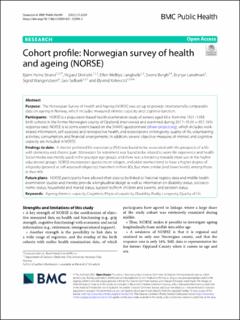| dc.description.abstract | Purpose The Norwegian Survey of Health and Ageing (NORSE) was set up to provide internationally comparable data on ageing in Norway, which includes measured intrinsic capacity and cognitive function. Participants NORSE is a population-based health examination study of seniors aged 60+ from the 1921–1958 birth cohorts in the former Norwegian county of Oppland, interviewed and examined during 2017–19 (N = 957, 16% response rate). NORSE is to some extent based on the SHARE-questionnaire (share-project.org), which includes work-related information, self-assessed and retrospective health, and expectations on longevity, quality of life, volunteering activities, consumption, and financial arrangements. In addition, several objective measures of intrinsic and cognitive capacity are included in NORSE. Findings to date A shorter preferred life expectancy (PLE) was found to be associated with the prospects of a life with dementia and chronic pain. Motivation for retirement was found to be related to work-life experience and health. Social media was mostly used in the younger age groups and there was a tendency towards more use in the higher educational groups. NORSE incorporates questions on religion, and older women tend to have a higher degree of religiosity (proxied as self-assessed religiosity) than men in their 80s, but more similar (and lower levels) among those in their 60s. Future plans NORSE participants have allowed their data to be linked to National registry data and midlife health examination studies and thereby provide a longitudinal design as well as information on disability status, socioeconomic status, household and marital status, support to/from children and parents, and pension status. | en_US |

